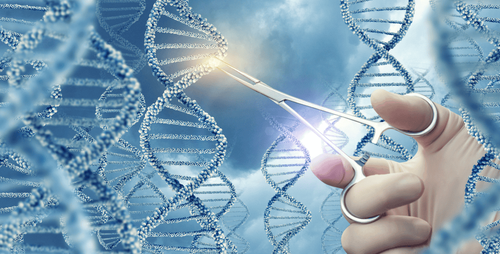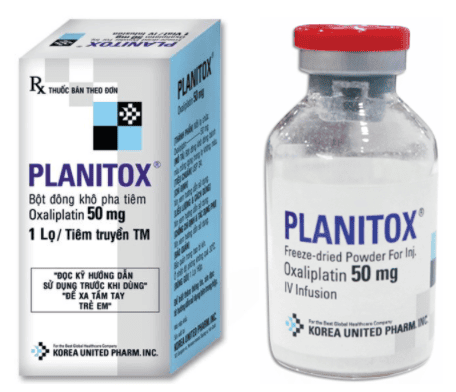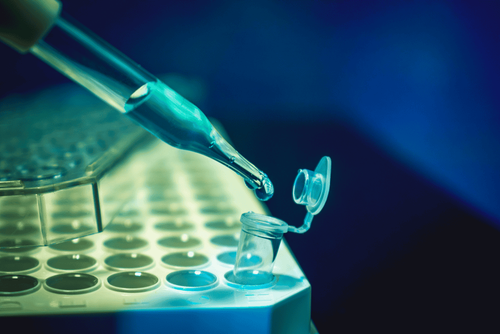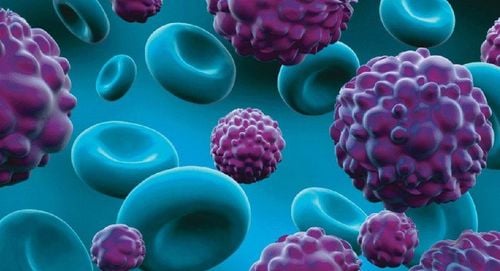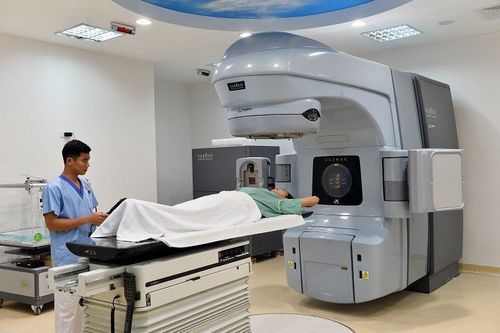This is an automatically translated article.
The article was written by MSc Doan Trung Hiep - Head of Radiation Therapy Department and Technician Nguyen Van Nam - Radiation Therapy Center - Vinmec Times City International Hospital.In 2015, an estimated 93,000 Americans were diagnosed with colon cancer. Rectal - anal canal cancer ranks 3rd in both men and women. Of these, 39,610 people will be diagnosed with rectal cancer. Especially if you were diagnosed with colorectal cancer before the age of 50, or if there are several other cancers that run in your family, you and your loved ones are at increased risk of familial colorectal cancer. Your loved one needs to be screened earlier than others.
1. Treatment of rectal cancer – anal canal
1.1. Radiotherapy
Radiation therapy is often used in combination with surgery and chemotherapy for treatment. Currently, in the treatment of low rectal cancer, radiation therapy is an indispensable part in combination with chemotherapy and surgery to bring the highest efficiency to patients.
The goals in cancer treatment are:
Destroy as much of the lesions (may use chemotherapy, radiation, surgery or a combination of measures) Preserve nearby organ function, ensure quality quality of life for the patient. In rectal cancer, preservation of the anal sphincter is one of the most important goals, in order to maintain natural bowel function. However, in cases where the tumor is located at a low location and has wide invasion, the surgeon will discuss with the patient about having to cut the entire anal canal to reduce the risk of early recurrence to save the patient. In the event that the anal canal is completely removed, you will be surgically created another anus in the abdominal wall, you will be instructed to wear a fecal bag right at the mouth of this "artificial anus".
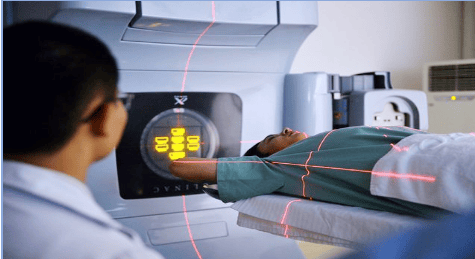
Indications for radiation therapy in the management of colorectal cancer, anal canal:
In colon cancer: Indications for radiation therapy are only given when surgery cannot be performed immediately due to tumor invasion into surrounding organs. which cannot be removed. The main role in colon cancer treatment is surgery followed by chemotherapy. In rectal cancer: when the tumor is large, invasive, has metastatic lymph nodes, it is necessary to receive radiation therapy or chemotherapy at the same time to make the tumor smaller and easier to dissect during surgery, thereby increasing the cure rate. increase the ability to preserve the anal sphincter for the patient. In other cases, radiotherapy or chemotherapy may be given after surgery to reduce the risk of local recurrence, in the pelvic region. Anal cancer: most are indicated for radiation therapy, in some cases radiation therapy can help many patients avoid surgery, preserve the anal canal.
1.2. Surgery
Surgery often plays a leading role in treatment. For colorectal cancers, surgery is the main curative treatment. The surgeon will determine how much colon is needed for surgical removal. Because the tumor can spread and invade adjacent lymph nodes, some lymph nodes are usually removed at the time of surgery.
For anal cancer, surgery is rarely used at the time of diagnosis because the "organ-sparing" approach of radiotherapy and chemotherapy is valuable.
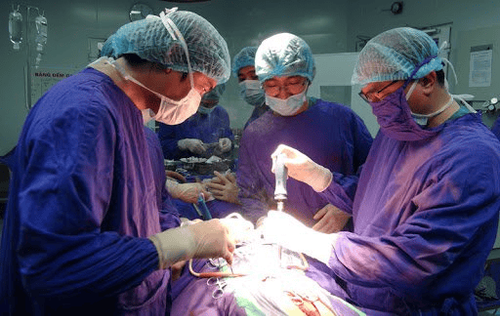
1.3. Chemotherapy (Chemotherapy)
While surgery and direct radiation therapy focus on the bowel and pelvic area, chemotherapy is often used to enhance the cure rate. The oncologist will evaluate and determine what drugs may work best.
Chemotherapy is a drug that can destroy cancer cells by different methods. Usually 2 or more drugs are used in combination for best results. Dosage and treatment schedule will vary. If chemotherapy is used in combination with radiation therapy, it is best to receive chemotherapy in the morning or 2 hours before radiation to increase the effectiveness of radiation therapy.
2. Radiation therapy for rectal cancer – anal canal
External radiation therapy: is a treatment method that uses a high-energy radiation generator to shine from a distance of 60 - 80cm into the tumor in the patient's body. The radiation source could be the Cobalt-60, or the linear accelerator.
Currently, Vinmec Hospital's radiation therapy center uses the Clinac iX linear accelerator of Varian - the United States to allow the most modern radiotherapy techniques in Vietnam to be performed for cancers, including cancer. rectal mail.

Before starting treatment, you will be scheduled for a treatment that includes a simulated CT scan, marking a reference position on the skin (usually a small ink mark on the skin) to allow the technician to Accurate radiation therapy to the tumor every day.
Usually, radiation therapy lasts several weeks and is treated 5 days a week (Monday to Friday). This allows your doctor to put enough radiation into your body to destroy tumor cells. While giving healthy cells time to regenerate each day. The radiation time is only about 90-120 seconds, but the total time from the time you enter the machine room to the time you leave the accelerator room will be about 10-13 minutes including the time you change the patient's clothes, the time to set the position on the machine, table calibration time, daily centered verification scan time, beam time, and time you change into personal clothing to complete a daily radiation dose fraction.
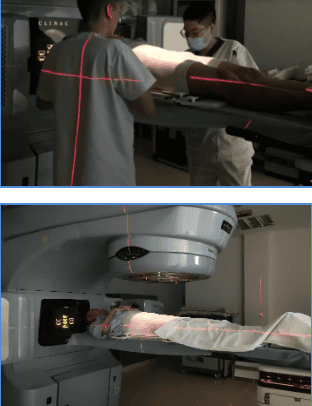
Before you enter the machine room, you will be evaluated by our medical staff before radiation therapy: including asking you about symptoms and discomfort you may have such as inflammation of the skin in the radiation area, burning pain. anus, genital-anal area, urination, appetite, nausea, vomiting, measure and take vital indicators such as pulse, blood pressure, body temperature...
Weekly you will be checked weigh yourself once on a certain day, your doctor will see you once a week. If there are any abnormal signs, you need to immediately notify your doctor, technician or nurse for appropriate support and treatment.

Radiotherapy techniques for colorectal and anal cancer include three-dimensional compatible radiation therapy (3DCRT - Three Dimenssion Conformal Raddiation Therapy), dose-modulated radiation therapy (IMRT - Intensity Modulated Radiation Therapy), radiotherapy Image Guided Radiation Therapy (IGRT) and Volumetric Modulated Arc Therapy (VMAT). The radiation therapist can provide more detailed information about these different radiotherapy techniques.
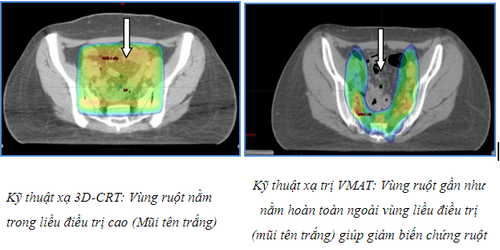
Possible side effects Abdominal pain, bowel disorders: Radiation therapy to the abdomen and pelvis can cause bowel problems more often, such as diarrhea, cramping pain around the navel. Urinary disorders: frequent urination, urinary frequency, dysuria. Hematuria is possible, but very rarely, because the dose of rectal radiation is lower than the dose tolerated by the bladder. However, these symptoms will subside after the end of treatment. Some patients experience fatigue or decreased taste. These are only temporary signs that appear during treatment. Nausea, vomiting: some patients appear nausea, vomiting, irritable bowel. These reactions are usually only transient, if it does not subside your doctor will prescribe medication to help you. Dermatitis caused by radiation therapy in the irradiated area: Usually the skin in the pelvis, below the navel, on the waist and hips. For patients with anal cancer it is obvious, but temporary skin irritation is often a major side effect of radiation therapy. If the skin reaction is severe, your treatment may be delayed. Tell your doctor and treatment team (including nurses and technicians) about any new symptoms you experience during treatment. Skin reactions vary from patient to patient, and most patients with pelvic radiotherapy have no or if any mild symptoms and resolve spontaneously after the end of radiation therapy. These side effects occur differently in all patients. Ask your doctor about what you can expect from this particular course of treatment. These side effects are usually controlled by medication and a change in your diet. Tell your doctor and nurse about side effects if you are experiencing them so they can help you feel better about them.

It is important to take care of yourself as best as you can during radiation treatment because the part of your body close to the tumor will also receive the radiation dose , although the radiation dose is not as much as for the cancerous area. These normal body parts need time and support to heal. A well-balanced diet, but getting enough physical activity and taking time to relax are very important in cancer treatment. Follow up with your doctor's orders, if you're not sure about something, ask your doctor or nurse any questions about your treatment. Be sure to tell your doctor about any vitamins or dietary supplements you're currently taking to make sure it's safe for you during radiation treatment. You need to take special care of your skin during or after the treatment is over. Avoid direct sunlight on the treatment area, avoid heat or cold. Do not use ointments or lotions on damaged skin without first checking with your doctor or nurse. You should also make sure to clean the skin throughout the radiation treatment area with warm water and neutral soap. Complete treatment and recovery can be challenging. Seek outside help from family and friends first. If you need more support let your treatment team know.

Some frequently asked questions Q1: Will I have to separate from my family, work and loved ones during radiation therapy? I worry radiation will affect others?
Answer: External radiation therapy for colorectal cancer is a safe and effective treatment. The radiation is emitted for only 90-120 seconds while you lie in the machine room and the radiation will "penetrate" the tumor to destroy them, the radiation will lose its activity as it travels through your body. This radiation only affects the irradiated area. Therefore, you should maintain activities as usual if your health allows.
Q2: Do I have to avoid any special foods during radiation therapy?
Answer: If you do not have a combined chronic medical disease that requires a special diet, you should maintain a healthy diet: eat enough energy, balance food ingredients, especially increase the intake of vegetables. fresh fruit, eat a lot of grapefruit, increase young fiber, abstain from spicy, hot, easily stimulated foods, limit alcohol, coffee, and solid tea. In addition, you need to drink enough water - that is, drinking water until clear urine is enough. Absolutely avoid constipation, if you have difficulty passing stools due to hard stools, notify your doctor immediately to add stool softeners and laxatives. Grapefruit is a very good fruit because it provides vitamin C, grapefruit peel is a very good natural laxative.

Q3: How do I prepare before each day of radiotherapy?
Answer: You need to remember your radiotherapy appointment. After the simulation is complete, the radiotherapy technician will send you a daily radiotherapy appointment. You need to arrive early at least 15 minutes before the time of radiation so that the medical staff can do the pre-radiation preparations. You should have a clean stool before going to radiation therapy, if the process of defecation is difficult, tell your doctor to add laxatives and soften stools to help you. If necessary, you may be given an enema with medicine, with clean water to remove all the stool in the rectum before the radiation. You should also drink 200-300ml of water 30 minutes before radiation therapy to make the bladder stretch before radiation. When the bladder is distended, the urine will push the bowel loops up from the irradiated area, greatly reducing the dose of radiation to the intestine, reducing the risk of radiation enteritis. In addition, the urinary bladder also helps maintain the tumor position like when you have a CT simulation, increasing the accuracy of the radiation.
Q4: Can I go to the office during radiation therapy?
Answer: This completely depends on your pre-radiation health, job demands, job characteristics and radiation toxicity. Usually, during radiation therapy, you can still work in the office with a moderate level, the work is not too busy, and the pressure is low. You should not sit in one position for too long, change your position every 2 hours, drink enough water, and exercise regularly.
Q5: Will my fitness regimen change?
Answer : You should maintain an active, open, balanced lifestyle. Every day you should walk briskly 5km/h for 30-60 minutes/day or cycle for 20-30km/h for 30-60 minutes. You should divide the volume of exercise into two times a day for easier adaptation and better health benefits. Total recommended time of physical activity is 250 minutes/week or more. Exercise helps you to be more balanced, eat and sleep more regularly, reduce the risk of constipation, strengthen the body's immune system...
You will reintegrate into life after treatment better if you exercise every day. during treatment. Before you begin exercising, consult your physician to see if your exercise is contraindicated or requires special attention.

Vinmec International General Hospital is one of the hospitals that not only ensures professional quality with a team of leading medical doctors, modern equipment and technology, but also stands out for its examination and consultation services. comprehensive and professional medical consultation and treatment; civilized, polite, safe and sterile medical examination and treatment space. Customers when choosing to perform tests here can be completely assured of the accuracy of test results.
Please dial HOTLINE for more information or register for an appointment HERE. Download MyVinmec app to make appointments faster and to manage your bookings easily.





